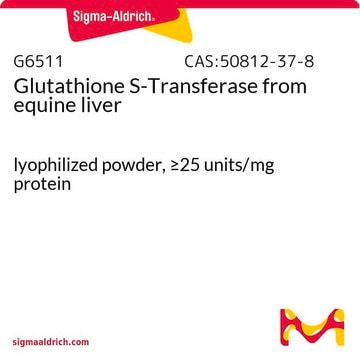GS70
GST P1-1, Recombinant Human
Sinónimos:
DFN7, FAEES3, GST3, GSTP, HEL-S-22, glutathione S-transferase pi
Iniciar sesiónpara Ver la Fijación de precios por contrato y de la organización
About This Item
Código UNSPSC:
12352200
NACRES:
NA.26
Productos recomendados
origen biológico
human
Nivel de calidad
recombinante
expressed in E. coli
Análisis
>95% (SDS-PAGE)
formulario
frozen liquid
actividad específica
60.45 units/mg protein
mol peso
23 kDa
temp. de almacenamiento
−70°C
Información sobre el gen
human ... GSTP1(2950)
Descripción general
using spectrophotometric determination of 1-chloro-2,4-dinitrobenzene (CDNB) conjugation with reduced glutathione (1.0 mM) in 100 mM KPO4 (pH 6.5) at room temperature.
Acciones bioquímicas o fisiológicas
Glutathione S-transferase pi 1 (GSTP1) is an enzyme that in humans is encoded by the GSTP1 gene. Glutathione S-transferases (GSTs) are a family of enzymes that play an important role in detoxification by catalyzing the conjugation of many hydrophobic and electrophilic compounds with reduced glutathione. Based on their biochemical, immunologic, and structural properties, cytosolic and membrane-bound forms of glutathione S-transferase are encoded by two distinct supergene families. At present, eight distinct classes of the soluble cytoplasmic mammalian glutathione S-transferases have been identified: alpha, kappa, mu, omega, pi, sigma, theta and zeta. The GSTs are thought to function in xenobiotic metabolism and play a role in susceptibility to cancer, and other diseases.
This GST family member is a polymorphic gene encoding active, functionally different GSTP1 variant proteins that are thought to function in xenobiotic metabolism and play a role in susceptibility to cancer, and other diseases.
Almacenamiento y estabilidad
The enzyme should be used by the end-user customer within 1 year of receipt.
Código de clase de almacenamiento
10 - Combustible liquids
Clase de riesgo para el agua (WGK)
WGK 1
Punto de inflamabilidad (°F)
Not applicable
Punto de inflamabilidad (°C)
Not applicable
Certificados de análisis (COA)
Busque Certificados de análisis (COA) introduciendo el número de lote del producto. Los números de lote se encuentran en la etiqueta del producto después de las palabras «Lot» o «Batch»
¿Ya tiene este producto?
Encuentre la documentación para los productos que ha comprado recientemente en la Biblioteca de documentos.
Los clientes también vieron
Junhua Wu et al.
PloS one, 10(6), e0128280-e0128280 (2015-06-06)
Brick tea type fluorosis is a public health concern in the north-west area of China. The association between SNPs of genes influencing bone mass and fluorosis has attracted attention, but the association of SNPs with the risk of brick-tea type
J Haluskova et al.
Bratislavske lekarske listy, 116(2), 79-82 (2015-02-11)
Prostate cancer (PCa) represents one of the most complicated human tumors and, like many others malignancies, arises from progressive genetic and epigenetic alterations. Among all recognized epigenetic alterations, aberrant DNA methylation (hypo- and hypermethylation) is the most important and the
Cheng-Fan Zhou et al.
Archives of dermatological research, 307(6), 505-513 (2015-06-06)
Numerous epidemiological studies have evaluated the association of Glutathione S-transferase P1 (GSTP1) Ile105Val polymorphism with the risk of skin cancer. However, the results remain inconclusive. To derive a more precise estimation of the association between the GSTP1 Ile105Val polymorphism and
Q F Li et al.
Genetics and molecular research : GMR, 14(2), 6762-6772 (2015-07-01)
Epigenetic silencing of the GSTP1 gene by promoter methylation has been associated with increased risk and shortened survival in patients with hepatocellular carcinoma (HCC). We therefore conducted a meta-analysis to obtain a more precise estimate of this association. By searching
Mohamad Nidal Khabaz et al.
Asian Pacific journal of cancer prevention : APJCP, 16(5), 1707-1713 (2015-03-17)
Eighty six cases of invasive ductal breast carcinomas were utilized to investigate GSTP1 polymorphisms in certain immunohistochemistry (IHC) subtypes of breast cancer with respect to ER, PR and HER2 expression. The frequency of wild allele homozygote, heterozygote and variant allele
Nuestro equipo de científicos tiene experiencia en todas las áreas de investigación: Ciencias de la vida, Ciencia de los materiales, Síntesis química, Cromatografía, Analítica y muchas otras.
Póngase en contacto con el Servicio técnico








